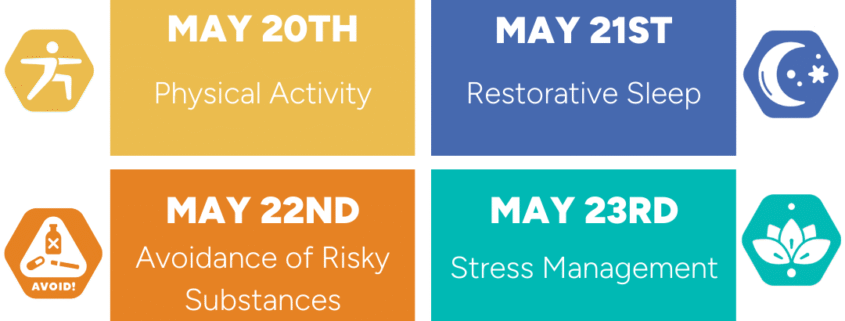Let’s Celebrate Lifestyle Medicine Week 2025!
Let’s Celebrate Lifestyle Medicine Week 2025!
Author: Erika Kawamura
Lifestyle Medicine Week 2025 is going on now, from May 18th-May 24th! Let’s use Day 1 to familiarize ourselves with Lifestyle Medicine and to set 1 intention for each of the pillars below. Then, devote each day to 1 pillar and practice that intention for that day! For example, if Day 2 is Physical Activity, then follow through with the intention you set for physical activity (e.g. go for a 30min walk outside); if Day 3 is Nutrition, an intention for that day could be trying a new vegetarian recipe for dinner or going meatless for that day; if Day 4 is Social Connections, you might decide to call an old friend you have been meaning to catch up with, or better yet, meet up in person; and, so on.
Many, if not all of you, may be wondering what lifestyle medicine is and why it might be relevant to you. Did you know that according to the Center for Disease Control and Prevention, approximately 75% of primary care physician visits are due to stress- related concerns and conditions? For example, headaches, gastrointestinal issues, muscle tension, jaw pain from clenching and TMJ, sleep difficulties, fatigue, and elevated blood pressure can commonly have stress as the underlying cause or pre-existing issues can be exacerbated by stress. In addition, according to the American College of Lifestyle Medicine, the leading causes of death in the United States are largely contributed by lifestyle behavioral factors.
Therefore, lifestyle medicine is a field of medicine that addresses the root causes of many of these common chronic health conditions that Americans suffer from. It uses the following 6 pillars of healthy lifestyle behaviors to prevent, treat, & when used intensively, can even reverse chronic conditions such as heart diseases, stroke, type 2 diabetes, and obesity:
1. A whole-food, plant-predominant eating pattern: Extensive research has supported the use of a whole-food, predominantly plant-based diet as an important strategy to prevent and treat chronic conditions, & when used in intensive therapeutic doses, can even reverse chronic illness. This type of diet consists of minimally processed vegetables, fruits, whole grains, legumes, nuts, & seeds; one that is rich in fiber, antioxidants, and nutrient- dense. Such eating patterns not only fuel your body, brain, and gut health with adequate nutrition, but can also decrease the inflammation that can cause disease.
2. Regular physical activity: Being sedentary for most of the day can lead to various health concerns, whereas regular physical activity has many physical and emotional health benefits. For example, it can improve and maintain cardiovascular health and muscle strength; improve sleep, energy, mood, confidence, self-esteem, and various cognitive functions (e.g. memory, focus, problem solving, reduce risk of cognitive decline); and, help manage or reduce stress, depression, and anxiety.
3. Restorative sleep: Chronic sleep difficulties can lead to sluggishness, decreased attention span, easily irritable, depressed mood, and decreased productivity or performance, as well as various metabolic & hormonal changes (e.g., decreased metabolism, increased hunger, decreased feeling of fullness, and increased risk of type 2 diabetes due to insulin resistance). Instead of seeing sleep as a modern day “luxury,” make it a priority to get seven or more hours per night for optimal health!
4. Stress management: While some stress can be “good” or motivate a person to pursue their goals, excessive and chronic stress or poor management of stress can lead to emotional distress, burnout, anxiety, depression, emotional eating, excessive alcohol or substance use, decreased immune system, inflammation, heart issues, obesity, and more.
5. Avoidance of risky substances (e.g, cigarettes, alcohol, drugs): Most people are aware that tobacco use, excessive alcohol consumption, and misuse of other substances can increase the risk of chronic diseases and death.
6. Positive social connections: Having positive social relationships can boost our physical, emotional, and mental wellbeing, whereas social isolation & loneliness can lead to higher risks of premature death, heart disease, & mental health issues such as anxiety & depression. In fact, especially for the elderly population, the health & mortality risks of social isolation can be similar to that of smoking a pack of cigarettes.
What will you do everyday during Lifestyle Medicine Week 2025 to participate in your mission to invest in your health and wellbeing? Remember, any small step counts, and kudos to those of you who find ways for those small changes to be desirable and sustainable in the long-term!
Equilibria is a group of licensed mental health professionals in Pennsylvania and New Jersey with multiple specialties to serve all aspects of our diverse community’s mental, emotional, and behavioral needs. We provide in person and telehealth services to individuals of all ages, families, and those in relationships. Click here to schedule an appointment today.


